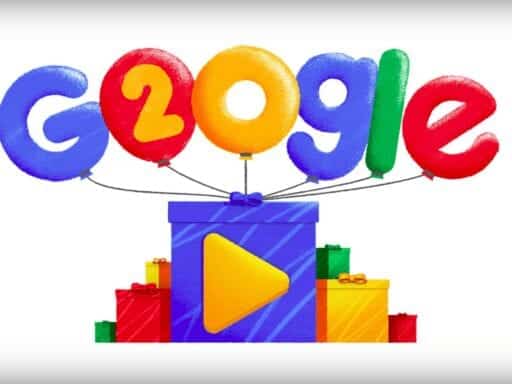A new Doodle celebrates popular Google search terms — and sidesteps the company’s complicated conquest of the internet.
Google’s 20th birthday is this month, and the once-unassuming search engine that grew up to change the internet is celebrating the milestone with a Google Doodle that chronicles some of the most popular search trends of the last two decades.
The Doodle animates popular search terms in multiple languages, from queries about Y2K to the translation for “love.” But it’s only one element of Google’s 20th birthday back-patting.
In keeping with the “popular searches in history” theme, the company has also launched 20years.withgoogle.com, a website dedicated to notable facts from the last 20 years of search trends. Examples: Heath Ledger was the most-searched actor in 2008 (the year of his death), Neymar has been the most-searched soccer player since 2017, and The Real World was the most-searched reality TV show from 1999 to 2001.
Meanwhile, on its official blog, the company has delved into the history of Google Doodles, highlighting 20 notable examples — including the first animated Doodle, which appeared for Halloween in 2000, and famous playable Pac-Man Doodle, which commemorated the game’s 30th anniversary in 2010.
/cdn.vox-cdn.com/uploads/chorus_asset/file/13161159/halloween_2000_google_doodle_loop.jpg) Art by Lorie Loeb / Google
Art by Lorie Loeb / GoogleGoogle has become a massive part of our culture — for better and for worse
Although Google founders Larry Page and Sergey Brin first registered the google.com domain in 1997, they didn’t officially incorporate Google, the company, until the following year. Google was officially founded on September 4, 1998, in the Menlo Park garage of their friend Susan Wojcicki, who then joined the company in 1999 as its first marketing manager. She would ultimately become the CEO of YouTube.
Since then, the company (restructured in 2015 to establish a parent company, Alphabet) has built upon its mega-successful search algorithm — which was originally called “Backrub” — to launch a whole slate of powerhouse internet tools and platforms, from its Chrome web browser to its Drive file storage and synchronization service to its Android operating system for smartphones. It also acquired YouTube in 2006, just a year after the video platform it launched; 12 years on, it’s probably safe to call that one a win.
But all this massive growth has led to unforeseen problems for Google. Among the most dire is the role the company has played in truth distortion online.
Said role is part of a broader phenomenon that researchers in a widely cited 2015 study have referred to as SEME — the “search engine manipulation effect” — but given that the word “google” is synonymous with “looking things up on the internet,” Google’s SEME is more impactful than most.
In 2015, the SEME study drew media attention to the fact that Google search results had the potential to manipulate the 2016 US presidential election. The study predicted that biased information gleaned from Google search results could not only shift the election results by as many as 2.6 million votes, but that it could “shift the voting preferences of undecided voters by 20% or more.”
When the results of the election blindsided many, scrutiny of the company’s methods and ubiquitous internet presence dramatically increased, with many people criticizing the company for surfacing extremist content in its search results and on YouTube. The criticism has been especially vocal regarding the latter, where the algorithm that serves recommended videos has elevated and placed ads on extremist propaganda and caused a moral panic about children’s content.
In grappling with the global fallout from all these factors, Google has come under fire, facing pressure from US lawmakers and sweeping reform via Europe’s General Data Protection Regulation law (GDPR). And the scrutiny is unlikely to let up anytime soon. Just this week, Google was invited to appear before the Senate Commerce Committee, where chief privacy officer Keith Enright acknowledged that the company has “made mistakes in the past” regarding privacy and data control.
In essence, while Google has largely used its power to innovate — resulting in huge advances in how we use the internet and conduct our lives online — as both the company and the internet have continued to grow, the challenges it faces have yielded increasingly difficult answers.
And it’s worth noting that for all its ubiquity, there are some questions Google just can’t provide satisfactory answers for. See, for example, one of its most popular search queries, as illustrated in the 20th birthday Doodle: the definitive pronunciation of “Gif.”
Author: Aja Romano



